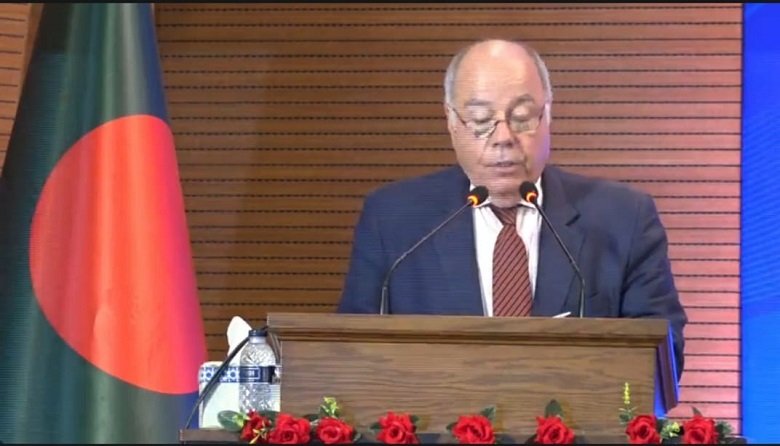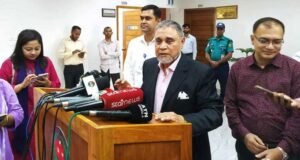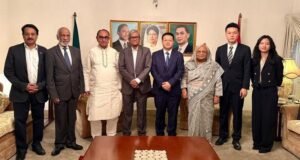
Brazilian Foreign Minister Mauro Vieira on Monday said global challenges are interconnected and can only be addressed through reinvigorated multilateralism, reforms and international cooperation.
“In that spirit, Brazil’s G20 Presidency believes that the group should work towards a United Nations that is more effective in its purposes, while tackling main inequalities in its decision-making processes,” he said while delivering a lecture at Foreign Service Academy on priorities for the Brazilian Presidency, UNB reports.
Foreign Secretary Masud Bin Momen, among others, spoke at the programme.
The visiting Foreign Minister said the international community has already proven its ability to adapt and evolve the structures of global governance in various areas.
“The G20 itself, for instance, which was consolidated in the immediate aftermath of a global financial crisis, has proven to be a valuable framework for addressing new challenges in many areas. The time has come for the G20 to make its own contribution by creating appropriate conditions for a serious discussion on the current global governance structures,” he said.
As one of the global fora best placed to foster the solutions the world needs, Vieira said, the G20 can be an invaluable tool to garner further support for the necessary and overdue reform of multilateral governance.
In 52 years of diplomatic relations between the two countries, this is the first time that a Brazilian Foreign Minister is visiting Bangladesh.
“My presence in Dhaka is a testimony to the importance we attach to our relations with Bangladesh, which have grown considerably in many areas, in tandem with the extraordinary economic leapfrog that Bangladesh has been enduring in recent years,” said the Brazilian Minister.
Brazil took over from India the presidency of the G20 on December 1, 2023. Under the leadership of President Lula, Brazil is proud to be the third in a sequence of four developing countries presiding over the group since 2022 (Indonesia, India, Brazil and, next year, South Africa).
In terms of priorities, Brazil has placed the topic of inequality, in all its dimensions, at the center of the G20’s agenda.
Under the motto “Building a Just World and a Sustainable Planet”, President Lula defined the following three general priorities for Brazil’s G20 Presidency: (1) social inclusion and the fight against hunger and poverty; (2) energy transitions and the promotion of sustainable development in its economic, social, and environmental dimensions; and (3) reform of global governance institutions.
Vieira said geopolitical tensions have recently amplified long-standing challenges. “Persistent hunger, poverty and inequality; armed conflicts with catastrophic humanitarian consequences; widespread setbacks in living standards; global inflation and debt vulnerabilities; high volatility in food and energy prices; and the climate crisis are among them.”
“While these crises affect us all, they do not affect us equally. Developing countries are the ones that bear the brunt of them. Even within countries, it is the poorest that always suffer the most,” he added.
Brazil believes that the G20 is one the forum that is particularly well placed to foster collective solutions for global challenges.
“Due to its combined share of the world’s population and GDP, as well as its diverse membership, the group has a unique and influential role to play in shaping a global agenda for a more equitable and sustainable future,” he said.
To fulfil that expectation, Brazil believes that the G20 must set ambitious goals and unlock the full potential of multilateral cooperation, he added.
Brazil believes that the G20 should explore the role of economy-wide platforms and a renewed engagement of the financial sector to achieve common goals under the United Nations Framework Agreement on Climate Change (UNFCCC) and its Paris Agreement.
The Intergovernmental Panel on Climate Change (IPCC) has confirmed that the world faces a climate emergency.
Vieira said humanity has only until the end of this decade to prevent the global temperature from rising beyond 1.5A° Celsius above pre-industrial levels, an outcome that would bear unacceptable risks to future generations, the ecosystems and infrastructure.
Without deep and extensive transformations in the way economies are structured and financial resources are mobilized and managed, humanity will struggle to adequately respond to the dangerous threats of climate change, he said.
By bringing together the world’s largest economies, which account for 3/4 of global greenhouse gas (GHG) emissions, the G20 can be a catalyst for partnerships, high-level coordination and new policy consensus, the Brazilian Foreign Minister said.
Earlier today, he met Prime Minister Sheikh Hasina at Ganabhaban.
“I was delighted to hear from her the high esteem she has for Brazil and for President Lula, which is reciprocal,” said the Brazilian Foreign Minister.
Considering the similarities between President Lula and Prime Minister Hasina’s world views, policies and priorities, in particular their quest for development and social justice, conditions are set for the bilateral relations to upscale, he added.
 Weekly Bangla Mirror | Bangla Mirror, Bangladeshi news in UK, bangla mirror news
Weekly Bangla Mirror | Bangla Mirror, Bangladeshi news in UK, bangla mirror news







